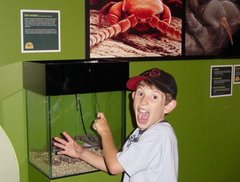Went to this great talk/discussion on Friday with the folks from Cisco and assorted others. Richard Allan, the Director of Government Affairs, Cisco UK, spoke about his experiences and where open government is and may be going in the UK. The major points/links I took from his talk were:
- Using screen scraping tools to re-purpose government data – this is how TheyWorkForYou started, using already available data in a more user-friendly format. Interestingly UK MPs now link to this site from their own websites as it's become so useful. There is an Australian version of this in Beta – check it out at OpenAustralia. Richard also gave other examples of people developing tools that use other sites, such as the LA Public Library feeding off Amazon so that you can run a tool while searching a book on Amazon to see if the public library has it instead. Richard stated that these types of applications are developed as people (often activists) aren't satisfied with what is available so go off and create their own portals and apps.
- Directionlessgovernment website – scapes both the "official" government portal and Google to demonstrate who gives better search results (try searching on pensions as Richard demonstrated and see what it returns!)
- Governments should provide re-usable data, not websites – this is something we have been talking about at the Museum with our website rebuild – seeing it as a platform for others to use and re-purpose rather than a static website of information from Museum to user.
- UK Civil Service online participation guidelines – these are really straightforward and sensible (note I used the directionless site and got straight there using the Google link not the UK gov portal link!). We've has some discussions on this issue in the museum sector, so great to see these, which will help our museum in particular as we're developing something similar for staff here.
- Other sites: netmums a large online information and sharing network; ratemycop where you can search for and upload information about police officers (love their tagline You have the right to remain informed!).
Here's the links I promised to send to people – seems easier to post them here for all to share:
- Museums and Web Paper I co-authored reporting on several Museum studies of online behaviour, has data from an survey I did about what Australians were doing online and the qualitative follow-up studies
- Our Dinosaurs Fan page on Facebook – this is where I uploaded the feedback I was getting from two groups we were working with
- Thoughts on web trends post
- Paper about museums using Facebook to communicate with their members
- Paper summarising the Brooklyn Museum's approach to social media and the web
- Frankie Roberto's paper where he gathered museum data via an FOI request and re-purposed it – Richard, Frankie is a cool guy and worth talking to when you get back home. Frankie works at the Science Museum and his blog is useful too
- Tasmanian Museum and Art Gallery's (TMAG) Facebook page and TMAGgots group – just a small taste of what's out there in the museums and Facebook world
- The World Without Oil Alternate Rality Game (ARG): this game involved 1800 signed up players and 60000 observers and used collective imagining, storytelling and real-life simulations in response to a fictional, but plausible, event, namely, an oil shock. Responses provided useful insight into oil policy and oil use and the game was a stimulus for changed actions in the 'real' world lives of participants.
Thanks Martin and Cisco – I really enjoyed myself.


